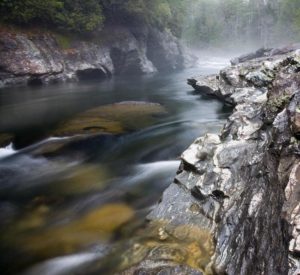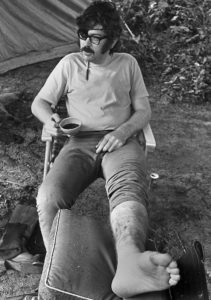When I was a young reporter, in the 1960’s, newspapers were big on first person stories, like spending a weekend at a nudist camp in the altogether.
I didn’t do that one.
I did, however, drive my car around Charlotte after a winter storm, when the roads were iced up, so I could write a story about how foolish it was to drive on ice. I got a good story – I slid off the road and banged up the front end of my car.
I paid a gypsy to tell me my fortune.
I ask the high sheriff to spray me with pepper spray so I could write about how it felt. It felt pretty bad — that story went way beyond the call of duty. The spray hit me in the forehead and a second later it felt like my face and head were on fire. And, of course, I couldn’t see a thing.
I went boar hunting in the mountains of North Carolina, and saw how you pull a pit bull off a hog.
I rode a canoe down the rapids on Section III of the Chattooga River, the ultimate test, I had read, for an undecked canoe.
And I spent six days and nights, alone, in the woods south of Charlotte with no tent and no food, nothing except a knife, a canteen, a pack of matches and a book called “How To Survive In the Wilderness.”
[I also had the tools of my craft: a pencil, a notebook, copy paper and a typewriter, so I could file a story every day about my adventures. I would write in the late afternoon and then walk half a mile or so from camp and leave my story bottled up in a fruit jar. Another reporter would pick it up early the next morning and take it to my paper, The Charlotte News.]
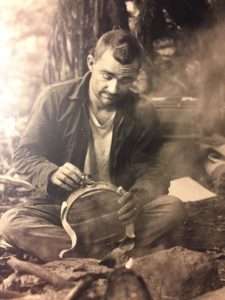
The News named my six-day series “Babe In The Woods,” an apt name. I was a 27-year-old, married, father of three who had lived on a farm as a child but had grown up to be a city boy. I had never camped in the woods alone. Ostensibly, I went without camping gear or food to see if I could live off the land. The real reason, of course, was to sell newspapers — and get my byline on page 1.
* * *
For the first two or three days I watched every step I took, afraid a snake would bite me. Toward the middle of the week, however, I relaxed. I didn’t care if I got bit, getting bit would mean going home. I wasn’t going to yell calf rope, of course — not in a 100 years — but a snake bite would have been an honorable way to call it a day. Later, when I knew I would be going home soon and I didn’t need a way out, I started watching my step again, watching for snakes.
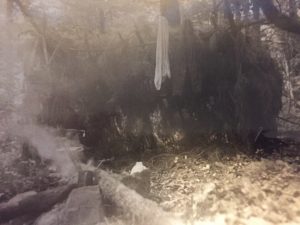
That first day I broke off some small pine trees and built a shelter. It looked good, but it didn’t keep the rain off of me. I slept curled up by my fire every night, even when it rained.
I didn’t have an ax so I picked a camp site near two fallen trees, big ones, but not so big I couldn’t drag them a few feet. That was my firewood. I got the biggest rocks I could carry and put them around my fire. The fire warmed the rocks and at night I would snuggle up to that warmth.
My camp was not far from the Catawba River, and so I had plenty of water. How safe it was to drink I didn’t know, so I strained it through my t-shirt and boiled it a quart at a time in a oil can I found beside a Jeep road, left there by hunters, I guess. I also used the oil can to boil the day lilies I picked every morning, before they opened, and cat tails. The day lilies tasted a lot like string beans and the cat tails, like corn. And I ate ripe, juicy, blackberries by the handful. I make a hook of sorts out of the wire in the spiral of my notebook and tried, without success, to catch fish. I did catch a little box turtle, poor thing, and ate him. And I found a bee hive and raided it. I got stung, but I also got some honey – and a story.
* * *
It was a hot, close to 100 degrees in the daytime and rainy some afternoons and evenings. At suppertime, their suppertime, swarms of mosquitoes came to see me. For the first few days I didn’t put a dateline on my story, a geographic identifier showing the reporter’s location. Later in the week I began using this dateline – CAMPNEVERAGAIN.
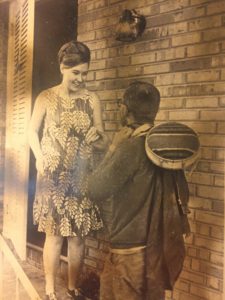
It wasn’t all bad, of course. I learned some things.
** I learned that you don’t get but so hungry. If you don’t eat for a day, you’re hungry but if you don’t eat for three days, you’re not three times as hungry.
** I learned that if you don’t have enough to eat, a place to sleep, you don’t worry about your appearance. Or cleanliness.
** I learned that I missed companionship, family and friends, more than I missed the comforts of home.
Coming Friday: Dean Smith: No Detail Too Small
